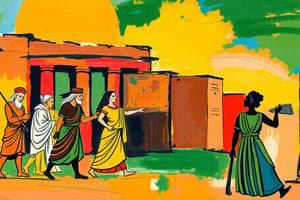Podcast
Questions and Answers
What are the key characteristics of the Prehistoric Era?
What are the key characteristics of the Prehistoric Era?
The Prehistoric Era is characterized by the development of early human cultures, the use of tools and art, and the discovery of fire.
Identify two major advancements during Ancient Civilizations.
Identify two major advancements during Ancient Civilizations.
Two major advancements during Ancient Civilizations are the emergence of writing and the development of agriculture.
What was a significant impact of the Black Death during the Middle Ages?
What was a significant impact of the Black Death during the Middle Ages?
The Black Death led to devastating population loss, which caused economic and social upheaval in Europe.
How did humanism influence the Renaissance?
How did humanism influence the Renaissance?
What were key outcomes of the Age of Exploration?
What were key outcomes of the Age of Exploration?
What are the three major conflicts of the Modern Era?
What are the three major conflicts of the Modern Era?
Describe the difference between primary and secondary sources.
Describe the difference between primary and secondary sources.
Who was Mahatma Gandhi and what was he known for?
Who was Mahatma Gandhi and what was he known for?
What is historiography?
What is historiography?
What is the significance of cultural exchange in history?
What is the significance of cultural exchange in history?
Flashcards are hidden until you start studying
Study Notes
Key Periods in History
-
Prehistoric Era
- Time before written records (up to 3000 BCE)
- Development of early human cultures and societies
- Use of tools, art, and the discovery of fire
-
Ancient Civilizations (3000 BCE - 500 CE)
- Emergence of writing, agriculture, and urban centers
- Major civilizations: Mesopotamia, Egypt, Indus Valley, China, Mesoamerica
- Key advancements: Mathematics, astronomy, law, and architecture
-
Classical Era (500 BCE - 500 CE)
- Rise of empires: Roman Empire, Persian Empire, Maurya and Gupta Empires
- Development of philosophical thought (e.g., Confucianism, Buddhism, Plato, Aristotle)
- Expansion of trade routes, like the Silk Road
-
Middle Ages (500 - 1500 CE)
- Feudalism in Europe; rise of the Byzantine Empire, Islamic Caliphates
- The Black Death and its societal impacts
- The Crusades and their influence on Europe and the Middle East
-
Renaissance and Reformation (14th - 17th Century)
- Revival of art and learning in Europe; humanism
- Reformation movements leading to Protestantism
- Significant figures: Leonardo da Vinci, Michelangelo, Martin Luther
-
Age of Exploration (15th - 17th Century)
- European exploration and colonization of the Americas and Asia
- Key figures: Christopher Columbus, Vasco da Gama, Ferdinand Magellan
- Impact on indigenous populations and global trade
-
Industrial Revolution (18th - 19th Century)
- Transition to industrial economies and mass production
- Innovations: Steam engine, textile machinery, transportation systems (railways)
- Urbanization and shifts in labor patterns
-
Modern Era (20th Century - Present)
- Major conflicts: World War I, World War II, Cold War
- Social movements: Civil rights, feminism, environmentalism
- Advances in technology and globalization
Key Concepts in History
- Historiography: Study of historical writing and methods
- Causation: Understanding causes and effects in historical events
- Chronology: Time order of events; helps to place events in context
- Primary and Secondary Sources:
- Primary: Original documents, artifacts
- Secondary: Analyses or interpretations of primary sources
Important Historical Figures
- Julius Caesar: Roman general and statesman, significant in the events leading to the rise of the Roman Empire
- Genghis Khan: Founder of the Mongol Empire, known for military strategies and conquest
- Mahatma Gandhi: Leader of Indian independence movement; known for nonviolent resistance
- Martin Luther King Jr.: Civil rights leader advocating for racial equality in the USA
Key Themes in History
- Conflict and Conquest: Analysis of wars, treaties, and their impacts on nations
- Change and Continuity: Understanding what changes over time and what remains constant
- Cultural Exchange: How cultures influence one another through trade, colonization, and migration
- Power and Authority: Study of governance, empire building, and the role of political systems
Prehistoric Era
- Period before written records, approximately up to 3000 BCE
- Early human cultures and societies developed
- Humans used tools, art, and discovered fire
Ancient Civilizations
- Between 3000 BCE and 500 CE
- Emergence of writing, agriculture and urban centers
- Major civilizations: Mesopotamia, Egypt, Indus Valley, China, Mesoamerica
- Advancements in mathematics, astronomy, law, and architecture
Classical Era
- Between 500 BCE and 500 CE
- Rise of empires including Roman Empire, Persian Empire, Maurya and Gupta Empires
- Development of philosophical thought like Confucianism, Buddhism, and ideas of Plato and Aristotle
- Expansion of trade routes, such as the Silk Road
Middle Ages
- Period 500 to 1500 CE
- Feudalism in Europe alongside the rise of the Byzantine Empire and Islamic Caliphates
- The Black Death and its impacts on society
- The Crusades and their influence on Europe and the Middle East
Renaissance and Reformation
- 14th to 17th century
- Revival of art and learning in Europe, characterized by humanism
- Reformation movements leading to Protestantism, significant figures: Leonardo da Vinci, Michelangelo, Martin Luther
Age of Exploration
- 15th to 17th century
- European exploration and colonization of the Americas and Asia
- Key figures: Christopher Columbus, Vasco da Gama, Ferdinand Magellan
- Impacts on indigenous populations and global trade
Industrial Revolution
- 18th to 19th century
- Transition to industrial economies and mass production
- Innovations like the steam engine, textile machinery, and transportation systems (railways)
- Urbanization and changes in labor patterns
Modern Era
- 20th century to present
- Major conflicts: World War I, World War II, Cold War
- Social movements: Civil rights, feminism, environmentalism
- Advancements in technology and globalization
Historiography
- Study of historical writing and methods
Causation
- Understanding causes and effects in historical events
Chronology
- Time order of events; helps place these events in context
Primary and Secondary Sources
- Primary Sources: Original documents, artifacts
- Secondary Sources: Analyses or interpretations of primary sources
Julius Caesar
- Roman general and statesman
- Played a significant role in events leading to the rise of the Roman Empire
Genghis Khan
- Founder of the Mongol Empire
- Known for military strategies and conquest
Mahatma Gandhi
- Leader of Indian independence movement
- Championed nonviolent resistance
Martin Luther King Jr.
- Civil rights leader advocating for racial equality in the USA
Conflict and Conquest
- Analysis of wars, treaties, and their impacts on nations
Change and Continuity
- Understanding what changes over time and what remains constant
Cultural Exchange
- How cultures influence one another through trade, colonization, and migration
Power and Authority
- Study of governance, empire building, and the role of political systems
Studying That Suits You
Use AI to generate personalized quizzes and flashcards to suit your learning preferences.




